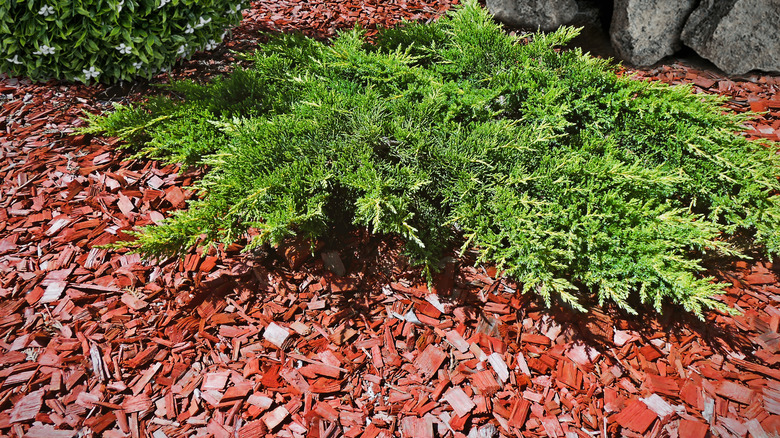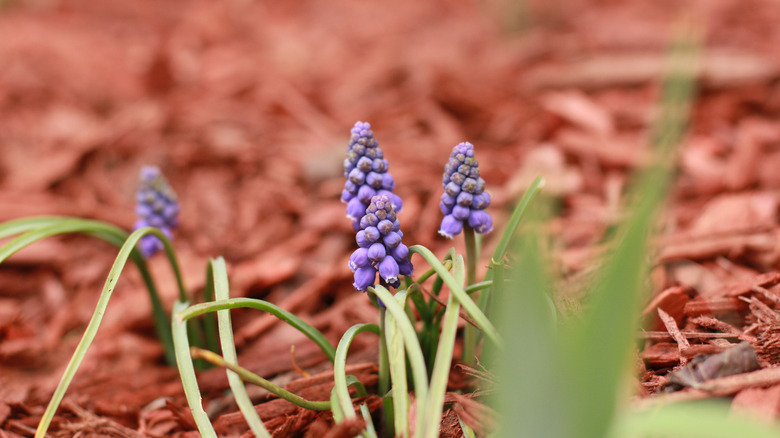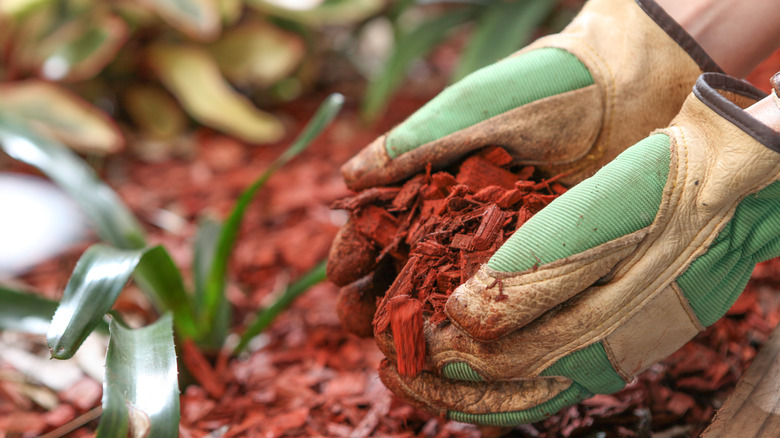The Benefits And Drawbacks Of Using Natural Cedar Mulch In The Garden
In the gardening world, mulch is akin to a secret weapon. The layering material tames unruly weeds, creates pathways, and preserves soil moisture. There are many varieties of mulch to consider, and cedar mulch just might catch your eye. Made from the bark of cedar trees, this mulch is characterized by its reddish-brown color. Because of its pigment, cedar is known to be more aesthetically pleasing compared to typical brown mulch. Gardeners usually place it in beds with larger plants like bushes, shrubs, and trees, thanks to the mulch's denser quality. Like anything else, there are some benefits and pitfalls to using cedar mulch in your garden.
These benefits include that it repels insects, controls soil temperature, and lasts longer than other mulches. On the other hand, downsides to using cedar mulch are that it is more expensive than other types of mulch, it may lower soil pH, and it can lose its pest-repellant quality rather quickly. Weighing the pros and cons can help you make an informed decision if you're debating whether or not to use cedar mulch in your garden.
The benefits of using natural cedar mulch
Cedar mulch offers a host of benefits that make it a good fit for your garden. For one, cedar mulch is the best type of mulch to use to repel insects. Cedar naturally contains chemicals and oils that deter insects, specifically aromatic chemicals known as phenols. This is helpful because mulch can create an environment where insects like millipedes, spiders, and ants like to harbor, but with cedar mulch's natural pesticide properties, the creepy-crawlies will prefer to stay away, thereby safeguarding your plants as well. It's important to note that while the claim that cedar chips repel pollinators is a popular belief, the answer isn't clear-cut. If you are concerned about this, you can use cedar mulch away from pollinator-friendly plants.
The next benefit is that cedar mulch helps regulate soil temperature. In the winter, cedar mulch insulates your soil. A layer of cedar mulch that is at least 2 to 3 inches thick is sufficient at preserving soil warmth. Meanwhile, the material can also keep the ground cool in the summer. The temperature control provided by cedar mulch creates conditions favorable to the lifespan of your plants in every season.
Lastly, cedar mulch lasts longer compared to other types of mulch. Cedar is known to decompose more slowly. As a result, you won't have to replace the wood chips as often, giving you time to focus on other gardening projects.
The downsides of using natural cedar mulch
When it comes to the downsides of using cedar mulch, one is that it can be more expensive than other types of mulch, because it's not as readily available. However, considering that cedar mulch is more durable, this might outweigh its initial expense. A second potential downside to using cedar mulch is that it can lower your soil's pH. This means that your options for what plants you can place your cedar around might be limited. To offset this, it would be helpful to do some research beforehand. This way, you can avoid placing the mulch near alkaline loving plants. Otherwise, if your plants don't mind acidic soil, cedar mulch shouldn't be a problem. In the event that your soil pH is negatively affected, you can learn how to fix imbalances.
You'll want to do some research beforehand as to what type of soil pH the plants where the mulch will be placed need. Otherwise, if your plants don't mind acidic soil, cedar mulch shouldn't be a problem. Lastly, the mulch can lose its pest repellant quality rather quickly. Therefore, it might be best not to rely on it as a primary means of pest control. Instead, you can use other eco-friendly ways to keep bugs out of your garden.


